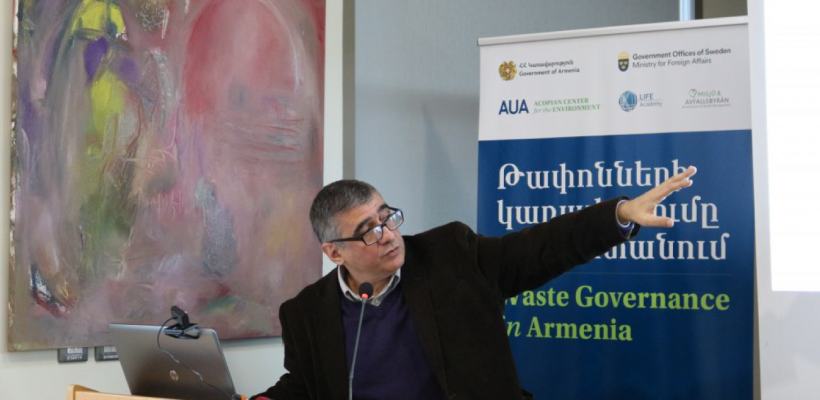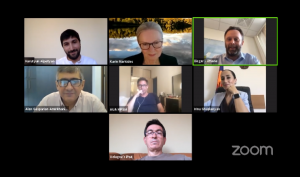
Final Report on Waste Governance in Armenia Released
2 min readYEREVAN, Armenia — On July 27, 2020, the American University of Armenia (AUA) Acopian Center for the Environment organized the closing event of the Waste Governance in Armenia project, presenting the Armenian and English versions of the 18-month project’s final report.
The project was implemented within the “Swedish Armenian SDG Expert Exchange Programme” funded by the Swedish Ministry of Foreign Affairs. The Swedish partners of the program were the Life Foundation and Miljö & Avfallsbyrån AB.
This study aimed to provide independent expert advice to the Government of Armenia on the development of national solid waste governance policy, strategy, and roadmap based on the circular economy and European Union (EU) waste governance principles as well as the requirements set by the Comprehensive and Enhanced Partnership Agreement (CEPA) signed between Armenia and the EU.
 “At AUA, we are engaged, and proud to be active partners, in solving complex problems in Armenia. A value-based sustainable operation of waste management will require a new mindset, and also, a collaboration of private-public-university stakeholders with the aim of circular thinking and circular economy,” stated AUA President Dr. Karin Markides in her opening remarks at the event. “Sustainable waste management requires a very clear transition from linear approaches to more systematic and circular ones, where the Ministry of Environment plays a key role,” added Dr. Irina Ghaplanyan, Deputy Minister of Environment of the Republic of Armenia.
“At AUA, we are engaged, and proud to be active partners, in solving complex problems in Armenia. A value-based sustainable operation of waste management will require a new mindset, and also, a collaboration of private-public-university stakeholders with the aim of circular thinking and circular economy,” stated AUA President Dr. Karin Markides in her opening remarks at the event. “Sustainable waste management requires a very clear transition from linear approaches to more systematic and circular ones, where the Ministry of Environment plays a key role,” added Dr. Irina Ghaplanyan, Deputy Minister of Environment of the Republic of Armenia.
Commenting on the study, AUA Acopian Center for the Environment Director Alen Amirkhanian noted, “It’s a comprehensive and, in many ways, first-of-its-kind approach to studying waste governance in Armenia. We looked at several waste streams including municipal, construction/demolition, electrical and electronic, automotive, industrial, medical, hazardous, and agricultural/biological.”
“I am impressed by the solid consultative process, multi-stakeholder and very holistic approach, as I understand, with eight different streams of solid waste that have been analyzed. Looking forward, we hope that this study will serve as an important input both for policy and dialogue in Armenia, and, going forward, this process will also include ministries, municipalities, as well as donor community, IFI’s and the civil society,” says Birger Karlsson, Charge d’Affaires, Embassy of Sweden in Armenia.
The study identifies 48 gaps and makes 44 recommendations for improving waste governance in the country. “We’ve analyzed gaps and made recommendations in four directions: legislative and regulatory framework; institutional framework; financial mechanisms; and infrastructure and technologies,” explained Harutyun Alpetyan, Circular Economy Expert at the AUA Acopian Center for the Environment. “We’ve recommended key concepts and mechanisms that need to be added into Armenian legislation as well as institutional reform options and some key programmatic approaches,” said Alpetyan.
The full report is available in Armenian and English on the project website.
The recording of the project closing event is available on the AUA Acopian Center’s YouTube channel.
The AUA Acopian Center for the Environment, a research center of the American University of Armenia, promotes the protection and restoration of the natural environment through research, education, and community outreach. The AUA Acopian Center’s focus areas include sustainable natural resource management, biodiversity, and conservation, greening the built environment, clean energy, and energy efficiency, as well as information technology and the environment.
